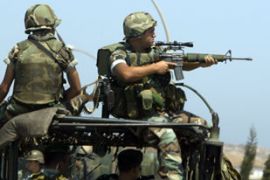Eight killed in Lebanon camp clash
One Syrian and 19 Lebanese members of Fatah al-Islam face possible death penalty.

Judiciary sources said the charges against the 19 Lebanese and one Syrian, all in custody, carried the death penalty.
The Lebanese authorities blamed the group for starting the confrontations by attacking army positions at the camp and near Tripoli on May 20.
The combatants exchanged artillery shells and mortar bombs for hours overnight in the heaviest fighting in a week, witnesses said.
But the clashes tapered off in the early hours of Wednesday.
Surrender
The Lebanese government has demanded that the fighters surrender.
A 1969 Arab agreement stops the army from entering Lebanon’s 12 Palestinian refugee camps, home to 400,000.
The government has given Palestinian leaders in Lebanon a chance to find a way out of the stand-off, as it is concerned that the refugees will see more army action at the camp as an attack on their community.
More than 25,000 of the camp’s 40,000 Palestinians have fled from the fighting.
Military solution
Most of the displaced refugees have flooded the nearby Badawi camp, where humanitarian organisations have been carrying out relief work.
| Your Views |
|
“The Palestinian refugees are not being treated properly by Lebanon” Sunny, Ottawa, Canada |
More food supplies, medicine and water were sent to Nahr al-Bared, whose remaining inhabitants have no electricity or running water, witnesses said.
The prospect of a decisive military solution to the stand-off has been played down by the government in recent days because it could trigger violence at other refugee camps, even though Fatah al-Islam has little support among Palestinians.
Members of Lebanon’s anti-Syrian cabinet have described Fatah al-Islam as a tool of Syrian intelligence, although Damascus denies any links to the group.
Lebanese authorities say Fatah al-Islam includes Arabs from Saudi Arabia, Algeria, Tunisia, Syria and Lebanon.